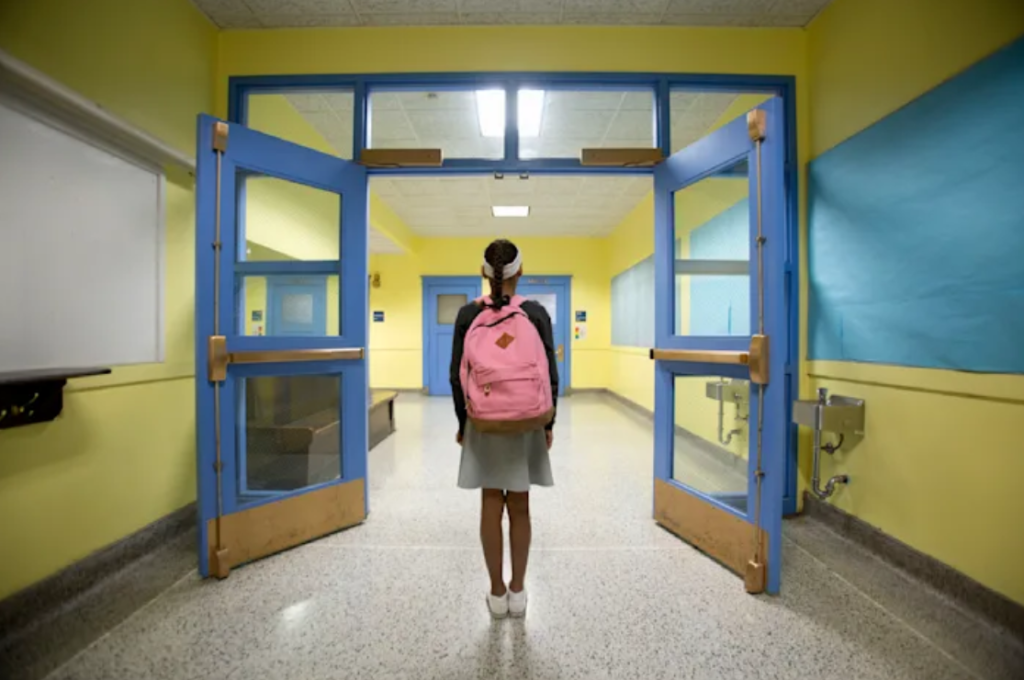
When news broke this week that students and teachers at Robb Elementary School in Youville, Texas, had been killed in a school shooting, Jennifer Lisa’s 10-year-old son walked in and found her crying.
“He was sitting next to me,” the New Jersey mother and parenting blogger said. “I allowed him to speak first – and the first thing he said was, ‘I just don’t understand why this keeps happening.'”
Like most parents, Liza didn’t know how to talk to her kids about school shootings, and she didn’t know how to respond. “It’s hard when we don’t know the answers for our kids, because the truth is, I don’t understand either,” said Lisa, whose two sons are 11 and 14. “We were all scared, and as a parent, I was very concerned that the answers were going to get harder and harder to find.”
Reena Patel is a parenting and school psychologist and author of “Winnie and Her Worries,” a children’s book dedicated to helping children deal with the things that worry them. In a world of frequent school shootings, Patel said, parents are unsure what to say to their children that is normal.
She said it’s important to process your own feelings about what you’re seeing and hearing before talking to kids about news events. “Let your brain and body feel those emotions,” she says. “You may feel numb and scared …… give yourself time to process and don’t be afraid to show your child these feelings because it’s normal to be sad or scared and your child should notice there’s nothing wrong with that feeling.”
How to help children deal with their feelings about school shootings
The first thing parents should do is reassure their children that their fears and concerns are normal, Patel said. “Validate their feelings,” she said. “Explain that when tragedy strikes, all feelings are OK. Getting children to talk about their feelings helps them look at things objectively and helps them express those feelings appropriately.”
It’s also important to make your kids feel like your home is a safe space for them to talk about what they’re worried about. Often, parents don’t need to plan what to discuss because kids will take the lead with their own comments. Patel says: “Let their questions be your guide for discussing how much information should be shared.” “Watch for signs that they might want to talk.”
If your child isn’t a talker, consider encouraging them to write or record their feelings. Listening to music or doing an art project can also help. Young children can especially benefit from concrete activities such as drawing or looking at picture books as a way to identify and express emotions, Patel says.
Patel suggests:-“Focus on healing and helping.” “Start in your own community and school:Make a commitment or pledge to support and make a difference, or write and draw pictures of love and kindness and give them to those who are affected, including workers on the front lines.”
How to help elementary school students talk about school shootings
Children in elementary schools may need simple, concrete examples of how their own school keeps them safe to make them feel better, Patel said. She said:-“Remind kids that outdoor doors are locked, that kids are monitored on the playground and that emergency drills are conducted during the school day.”
Trina Diakabanzila, who has a 6-year-old daughter, said that when it comes to the shooting in Uvalde, she tells her children, “The world is a great and beautiful place – it’s just that sometimes the people inside make it look ugly. ” Nonetheless, the South Carolina mother said her daughter already feels unsafe living elsewhere in the world because her mother served in the military.
Diakabanzila said, “We visited Ghana and she saw how peaceful it was and mentioned that they don’t use guns to kill people there.” “We also lived briefly in South Korea and she mentioned how much she missed living there and how peaceful it was and how they could go out and play and I didn’t have to worry about her.”
“Something has to be done,” she added. “There are still a lot of questions to be answered.”
Patel said that while we shouldn’t keep young children away from the world they live in, overexposure to these events can lead to serious stress. She says: “Pay attention to the fact that most people are good people, but sometimes a few people make bad choices.” “Talk about what you can do as a family to ensure the safety of your community.”
How to talk to middle school students about school shootings
In middle school, Patel said, kids are more likely to question whether they are safe and what steps the school is taking to protect them. She says: “Talk about what their school and community leaders are doing to provide a safe school.”
For her youngest son, Lizza said she tried to protect him from the news of the Robb Elementary School shooting. “I held him close before bedtime,” she said. “The next morning before school, he asked me if something like that would happen at his school, and while the truth is, it would, I decided to tell him that all the adults were working hard to make sure they were safe.”
Talking to high school students about school shootings
Patel said high school students may want to take action and ask what they can do to keep themselves and their school community safe. Patel shared, “High school students want to feel in control and want to play a role in safety.” “Remind them of the importance of following the school’s safety guidelines and of reporting any threats or unusual behavior they see. It’s also important to encourage kids this age to seek help to support their mental health needs.”
But mental health and high school students are also often areas where parents should get involved. “Anxiety is the fear of the unknown, something that happens in an environment where a child should feel safe,” she says. “That’s where our kids spend the most time.”
If teens feel anxious, sad, irritable or have trouble sleeping, Patel said it’s important to reassure them that this is a normal reaction. “Encourage teens to be patient,” she said. “Remember that it’s normal to have a strong reaction to something painful, and take things one day at a time as you recover. Over time, the symptoms should start to get better.”
Other ways to help children deal with tragic news
Patel says there are other things parents can do to help their children deal with difficult news. For starters, it’s a good idea to check with them on the safety protocols at the child’s school. In addition to alerting children to active shooter training and discussing how protocols would pick up from school in an emergency, Patel said, “help children identify at least one adult in school and in the community to go to if they feel threatened or at risk.”
It’s also important to limit media coverage of children. Patel warns, “Inappropriate information can lead to developmental anxiety or confusion, especially for young children.” “Adults also need to be aware of what they are talking about in front of children, even teenagers.”
Having a consistent routine at home can also help children feel more secure, Patel said. Getting enough sleep, a healthy diet, a regular routine, homework and extracurricular activities can all make kids feel safer in the world around them.
Aliette Silva, of Florida, has two children in elementary school. She says she’s used to talking to her kids about things like shooting practice and safety precautions. She said, “We talk about how they should run and take school training seriously.” “I wish we lived in a world where kindergarten didn’t have to do that, but that’s no longer the reality.”
Patel said that while school shootings have become a reality for most children, it’s important to pay close attention to long-term changes in a child’s mental state. “Changes in behavior, appetite and sleep patterns can also indicate a child’s level of anxiety or discomfort,” she explains. “For most children, these symptoms will resolve over time, but if you’re really concerned, seek the help of a mental health professional.”

